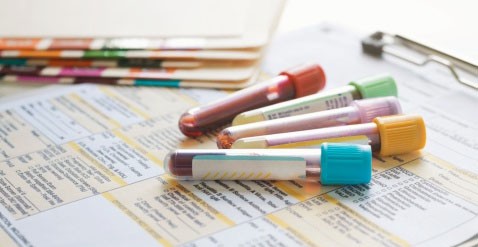
A simple blood test may be able to accurately predict whether a woman with breast cancer will suffer a relapse months before evidence of a tumor would be detectable on scans or biopsies.
The technology, developed at the Institute of Cancer Research (ICR) in London, works by detecting cancer DNA in the bloodstream before the cells grow into tumors. The results of a prospective pilot study of the test were published Wednesday in the journal Science Translational Medicine.
Using a technique called mutation tracking, the ICR researchers were able to detect traces of breast cancer in the bloodstream an average of 7.9 months before traditional biopsies or imaging scans would have shown tumors, referred to as clinical relapse.
Researchers say the blood test they developed can detect an individual’s specific “circulating tumor DNA,” or ctDNA, matched to the cancer for which they were treated. Previous research has also indicated that mapping cancer DNA could be one of the keys to earlier disease detection.
In this study, the team followed a 55 English women who were diagnosed with early stage breast cancer, then treated with both surgery and chemotherapy. They monitored ctDNA in the women’s blood tests after surgery and every six months using the DNA profiles of each individual’s specific pre-treatment cancer cells.
Overall, women who tested positive for ctDNA after undergoing surgery and chemotherapy were found to be 12 times more likely to face the disease again than women who tested negative. A total of 15 patients relapsed, and the blood test correctly gave advanced warning in 12 of those cases. The other three patients all had malignancies that had spread to the brain, where the protective blood-brain barrier could have stopped the fragments of the cancer from entering the bloodstream, the researchers wrote.
The test detected cancerous DNA in one patient who had not relapsed as of the last follow-up. This is a low false-positive rate, particularly given the 80% true-positive detection rate.
Breast cancer is the most commonly diagnosed cancer among women, aside from skin cancers, and the second most deadly cancer in women. One of the ongoing challenges in treating women with early-stage breast cancer is that, to date, there is no reliable method for determining who is at high risk of developing future secondary cancer after they have undergone treatment.
Knowing whether or not treatment was able to remove all traces of cancer in the bloodstream would be key to preventing the tumors from returning and spreading elsewhere in the body. Not only would this offer new opportunities for prevention and early intervention, but it would also help to reduce over-treatment by allowing doctors to identify and target those who have a high risk of recurrence.
However, the test is not ready for primetime just yet and more research remains to be done. For one thing, the number of women enrolled in the study was small; researchers will have to repeat the study using a much larger group of people to make sure that the blood test really is as accurate as it seems. In addition, the study only sampled blood for a period of two years after treatment, so scientists don’t know yet if the test can be used to predict a relapse after that period.
Another issue is that recurrent forms of breast cancer are “rarely curable,” so it’s unclear whether or not detecting the early signs of a relapse would actually offer a chance for a cure, the researchers note. That’s something that will have to be worked out in larger controlled trials.
“The key question is, ‘are we identifying that these women are at risk of relapse early enough that we could give treatments that could prevent the relapse?’” Dr. Nicholas Turner, one of the researchers, told BBC News. “That is unknown from this research and we hope to address it in future studies.”
If proven effective in more rigorous studies, Dr. Turner says the principle underlying the test “could potentially be applied to any cancer that has gone through initial treatment for which there’s a risk of relapse in the future.”
